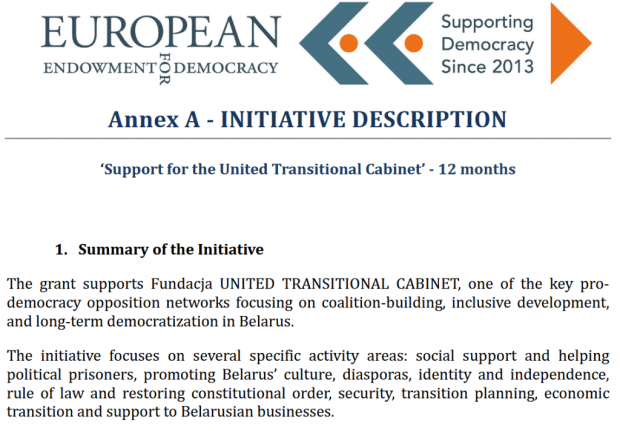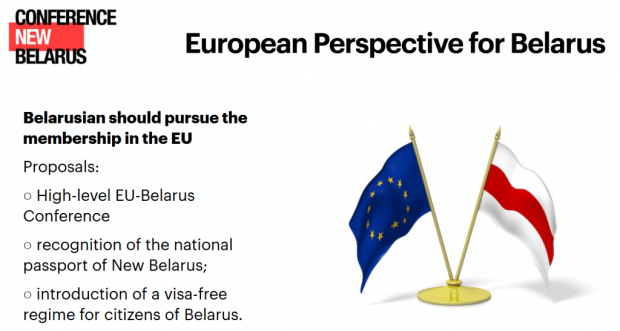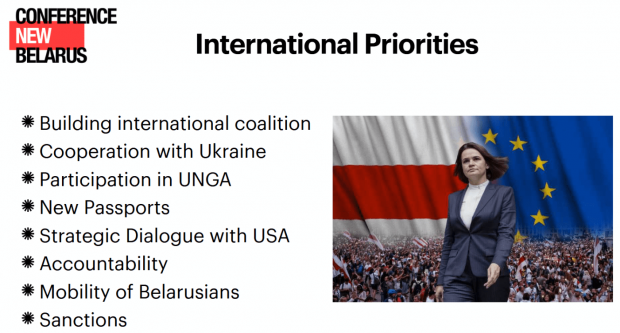Sviatlana Tsikhanouskaya was hailed by Western governments and media as the savior and rightful leader of Belarus. But leaked emails reveal her increasingly unpopular campaign for power in Minsk nearly collapsed under the weight of corruption scandals and infighting.
When Belarusian opposition figure Sviatlana Tsikhanouskaya declared herself “President” of an alternative government in 2020, she was enthusiastically embraced – and showered with funding – by the Western governments which yearned to depose the longtime leader of her country, Alexander Lukashenko, and remove Russia’s closest regional ally from the geopolitical chessboard. The New York Times set the tone by lionizing Tsikhanouskaya as a modern-day Joan of Arc.
However, a wave of public scandals have prompted Tsikhanouskaya’s foreign sponsors to gradually abandon her unpopular crusade to topple the government of Lukashenko. In August, it was revealed she had secretly taken thousands of euros from Minsk’s KGB in August 2020, a payoff for publicly pleading with protesters to stop their action in the streets, before she fled the country. Tsikhanouskaya had kept this agreement a closely guarded secret until it was exposed, and has attempted to evade it ever since.
Leaked documents and emails obtained by The Grayzone reveal that Tsikhanouskaya’s once-vaunted Belarusian “government in exile” nearly collapsed under the weight of corruption, fantastical ambition, gross incompetence, and infighting.
After claiming victory in Belarus’ August 2020 presidential election, the previously unknown Tsikhanouskaya became a darling of the West. After fleeing for Lithuania, where she claimed to be the legitimately elected leader of her country, her crusade for regime change began to lose momentum. Following the Russian invasion of Ukraine in February 2022, her backers in Washington and Brussels turned their focus toward propping up the government in Kiev.
Hoping to reclaim some of the Western spotlight, Tsikhanouskaya formed a so-called United Transitional Cabinet (UTC) in August 2022. It was a government-in-waiting, primed to take power if Lukashenko was toppled, banking on crippling Western sanctions imposed over Minsk’s “military support for Russia” to turn the tide.

In the meantime, Tsikhanouskaya and her motley retinue continued to reap hundreds of millions of dollars in Western contributions. Yet none of their efforts brought her closer to power in Belarus or contributed to any material change on the ground. All they achieved was the promotion of Tsikhanouskaya’s personal brand to Western audiences.
Despite her dimming hopes in Minsk, leaked material reviewed by The Grayzone reveals that Brussels and Washington were convinced Tsikhanouskaya could still seize power, and pumped significant resources into a variety of initiatives to promote her UTC.
For example, the European Endowment for Democracy issued a secret 12-month grant for “increased recognition and legitimacy” of UTC as “the ‘Alternative Government’ by the end of 2024 among Belarusian citizens and the international community.” The EED was proudly “named after and inspired by” the US government’s National Endowment for Democracy, which awarded Tsikhanouskaya with its Democracy Service Medal in 2024.
Leaked records of the EED grant show the Endowment’s clandestine project to bring Tsikhanouskaya to power focused on first establishing a parallel exile government structure. This included producing a “new national passport… with international recognition” which would be administered by UTC, and removing Minsk from its role in supporting Russia’s war with Ukraine and the West. These moves were intended to lay foundations for “a future democratic Belarus” led by UTC.
Tsikhanouskaya’s cabinet was also to construct a “comprehensive strategy for democratic transition” in Belarus, outlining “a clear roadmap for transferring power from the current regime to a democratic government, including specific actions and protocols for various stages of the transition.”
Tsikhanouskaya’s clan planned to extend its influence by establishing a “permanent presence” in Kiev, “demonstrating solidarity with Ukraine in the face of Russian aggression” and firmly planting them in the West’s anti-Moscow camp.
The leaks spell out in extraordinary detail how UTC tore itself apart failing to achieve these far-reaching objectives. While Tsikhanouskaya satisfied her Western sponsors by adopting a stridently pro-EU stance and belligerent tone on Russia, her radical shift set the stage for her public undoing.
UTC commits political suicide with anti-Russia, pro-EU push
In early August 2023, Tsikhanouskaya’s United Transitional Cabinet convened a summit in Warsaw, Poland on the subject of “New Belarus.” It was a prize opportunity for the president-in-waiting and her UTC acolytes to regain visibility and sympathy among Western audiences.
Leaked records of the conference show UTC took advantage of the moment to lay out a bold set of proposals.
There, Tsikhanouskaya’s self-styled shadow administration committed to a “European perspective for Belarus,” including EU membership, and the creation and recognition of a separate “national passport of New Belarus” which would provide visa-free travel across the bloc for dissidents. UTC’s proclamation struck a viscerally anti-Russian tone, calling for the “withdrawal of Belarus” from any and all “alliances” with Moscow, and the removal of Russian military installations, weapons, and troops from the country.


After securing Lukashenko’s ouster, UTC pledged to back “Belarusian volunteers in Ukraine” fighting Russian forces, support “pro-Ukrainian initiatives and campaigns,” and end what it called Minsk’s “complicity in Russia’s war.” While expedient for European and US political and public consumption, these positions accelerated the erosion of Tsikhanouskaya’s already negligible popularity at home. Western polls consistently show, if push comes to shove, most Belarusians of all ages favor greater integration with Russia, not Brussels.
These longstanding pro-Moscow sympathies may explain why Tsikhanouskaya avoided advocating overtly Russophobic policies during her 2020 presidential run. That year, Tsikhanouskaya’s opposition ‘Coordination Council’ passed a resolution declaring that Minsk would not reorient away from Russia if she took power, and the country’s “constitutional order and foreign policy” would remain unchanged.
In keeping with many European liberals, her foreign policy calculus altered radically following the Ukraine proxy war’s eruption. However, while the August 2023 conference generated some positive headlines for Tsikhanouskaya, openDemocracy offered a withering appraisal of UTC’s abrupt pro-Western shift.
The outlet declared Tsikhanouskaya’s aggressive push for EU membership and suddenly bellicose stance on Russia demonstrated how she and her clique were “out of touch” with opposition elements within Belarus and the wider public, who felt UTC was “increasingly detached from their concerns.” In any event, openDemocracy noted Tsikhanouskaya et al had “little influence” in the country itself by this point, and their exiled supporters were more disillusioned than ever with UTC’s prospects. By embracing the West, the outlet warned Tsikhanouskaya risked becoming “an irrelevance.”
Undeterred by their growing isolation, Tsikhanouskaya and her UTC doubled down. The “New Belarus” passport became a core component of their crusade. Initially, the initiative elicited significant media interest, and European parliamentarians called on EU member states to recognise the documents as legitimate.
However, the passport stunt quickly triggered internal feuds over funding and responsibility for the project, eventually prompting the resignation of a founding member of Tsikhanouskaya’s “government-in-exile.”












